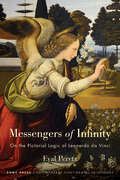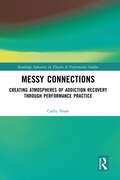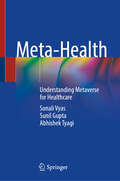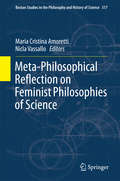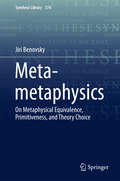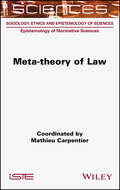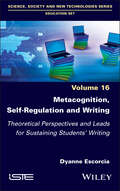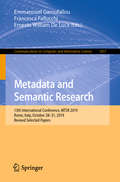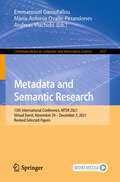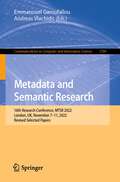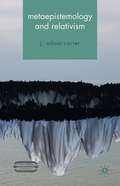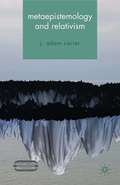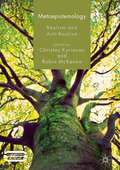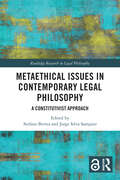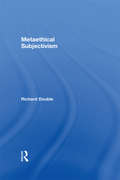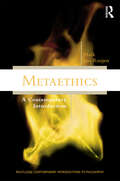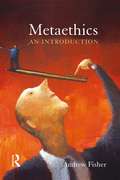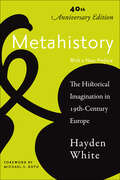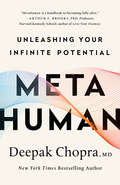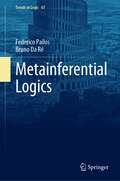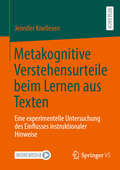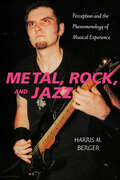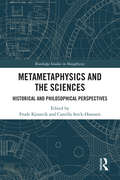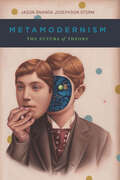- Table View
- List View
Messengers of Infinity: On the Pictorial Logic of Leonardo da Vinci (SUNY series in Contemporary Continental Philosophy)
by Eyal PeretzThe first philosophical engagement with the pictorial work of Leonardo, seen as a systematic whole.Presented here is the first philosophical engagement with the pictorial work of Leonardo, seen as a systematic whole. It is not written from the point of view of an art historian, even as it tries to benefit from art historical insights and procedures, but that of contemporary continental philosophy and theories of modern artistic media. Author Eyal Peretz's main objective is to understand the historical and logical place Leonardo's paintings occupy in the transition from the age of medieval sacred images to Renaissance or early modern painting. Leonardo, Peretz argues, introduced a media revolution, which has still not been fully assimilated and understood. His "modernity" is still ahead of us. Written in a clear and engaging style, Messengers of Infinity, will appeal equally to Leonardo experts, experts in continental philosophy, and those who are experts in neither of these fields but have an intellectual curiosity about the historical and conceptual significance of Leonardo in particular and of modern painting in general.
Messy Connections: Creating Atmospheres of Addiction Recovery Through Performance Practice (ISSN)
by Cathy SloanThis book examines performance practices that involve people in recovery from addiction, theorising such practices as recovery-engaged.Focusing on examples of practice from a growing movement of UK-based recovery arts practitioners and performers, it highlights a unique approach to performance that infuses an understanding of lived experiences of addiction and recovery with creative practice. It offers a philosophy of being in recovery that understands lived experience, and performance practice, as a dynamic system of interrelations with the human and nonhuman elements that make up the societal settings in which recovery communities struggle to exist. It thereby frames the process of recovery, and recovery-engaged performance, as an affective ecology – a system of messy connections. Building upon ideas from posthumanist research on addiction, cultural theory on identity and new materialist interpretations of performance practice, it considers how such contemporary theory might offer additional ways of thinking and doing arts practice with people affected by addiction. The discussion highlights the distinct aesthetics, ethics and politics of this area of performance practice.This study will be of great interest to students and scholars in Applied Theatre and Critical Arts and Mental Health studies.
Meta-Health: Understanding Metaverse for Healthcare
by Sunil Gupta Sonali Vyas Abhishek TyagiMetaverse is an emerging trend these days. It reflects in every field, like education, entertainment, business, and even healthcare. As we can experience, the Healthcare industry is constantly transforming due to emerge of new trends and technologies like moving from X-Rays to digital reports and from telehealth to Virtual Reality. It is a vast digital shift from regular practices to innovative techniques for efficient healthcare services. Metaverse plays a significant role in changing healthcare because it connects innovative technologies like Artificial Intelligence, Virtual Reality, Augmented Reality, IoT, Web 3.0, Quantum Computing, Robotics, etc. This book discusses the application area of utilizing Metaverse in Healthcare services. It focuses on various research trends and technologies related to implementing a metaverse in healthcare systems. It also covers challenges, emerging trends and techniques, and future directions for meta-healthcare systems.
Meta-Philosophical Reflection on Feminist Philosophies of Science
by Maria Cristina Amoretti Nicla VassalloThis volume offers a meta-philosophical reflection on feminist philosophies of science. It emphasizes and discusses both the connections and differences between "traditional" philosophies of science and feminist philosophies of science. The collection systematically analyses feminist contributions to the various philosophies of specific sciences. Each chapter is devoted to a specific area of philosophy of science: general philosophy of science, philosophy of biology, philosophy of climate sciences, philosophy of cognitive sciences and neurosciences, philosophy of economics, philosophy of history and archaeology, philosophy of logic and mathematics, philosophy of medicine, philosophy of psychology, philosophy of physics, and philosophy of social sciences. Since some of these areas have so far rarely been addressed by feminist philosophers, this new collection provides new angels and stimulates the debate on pivotal issues that are part and parcel of both "traditional" philosophies of science and feminist philosophies of science. Using a range of different methodologies and styles, the essays all show great clarity in both arguments and contents.
Meta-metaphysics
by Jiri BenovskyMetaphysical theories are beautiful. At the end of this book, Jiri Benovsky defends the view that metaphysical theories possess aesthetic properties and that these play a crucial role when it comes to theory evaluation and theory choice. Before we get there, the philosophical path the author proposes to follow starts with three discussions of metaphysical equivalence. Benovsky argues that there are cases of metaphysical equivalence, cases of partial metaphysical equivalence, as well as interesting cases of theories that are not equivalent. Thus, claims of metaphysical equivalence can only be raised locally. The slogan is: the best way to do meta-metaphysics is to do first-level metaphysics. To do this work, Benovsky focuses on the nature of primitives and on the role they play in each of the theories involved. He emphasizes the utmost importance of primitives in the construction of metaphysical theories and in the subsequent evaluation of them. He then raises the simple but complicated question: how to make a choice between competing metaphysical theories? If two theories are equivalent, then perhaps we do not need to make a choice. But what about all the other cases of non-equivalent "equally good" theories? Benovsky uses some of the theories discussed in the first part of the book as examples and examines some traditional meta-theoretical criteria for theory choice (various kinds of simplicity, compatibility with physics, compatibility with intuitions, explanatory power, internal consistency,. . . ) only to show that they do not allow us to make a choice. But if the standard meta-theoretical criteria cannot help us in deciding between competing non-equivalent metaphysical theories, how then shall we make that choice? This is where Benovsky argues that metaphysical theories possess aesthetic properties - grounded in non-aesthetic properties - and that these play a crucial role in theory choice and evaluation. This view, as well as all the meta-metaphysical considerations discussed throughout the book, then naturally lead the author to a form of anti-realism, and at the end of the journey he offers reasons to think better of the kind of anti-realist view he proposes to embrace. www. jiribenovsky. org
Meta-metaphysics: On Metaphysical Equivalence, Primitiveness, and Theory Choice (Synthese Library #374)
by Jiri BenovskyMetaphysical theories are beautiful. At the end of this book, Jiri Benovsky defends the view that metaphysical theories possess aesthetic properties and that these play a crucial role when it comes to theory evaluation and theory choice.Before we get there, the philosophical path the author proposes to follow starts with three discussions of metaphysical equivalence. Benovsky argues that there are cases of metaphysical equivalence, cases of partial metaphysical equivalence, as well as interesting cases of theories that are not equivalent. Thus, claims of metaphysical equivalence can only be raised locally. The slogan is: the best way to do meta-metaphysics is to do first-level metaphysics.To do this work, Benovsky focuses on the nature of primitives and on the role they play in each of the theories involved. He emphasizes the utmost importance of primitives in the construction of metaphysical theories and in the subsequent evaluation of them.He then raises the simple but complicated question: how to make a choice between competing metaphysical theories? If two theories are equivalent, then perhaps we do not need to make a choice. But what about all the other cases of non-equivalent "equally good" theories? Benovsky uses some of the theories discussed in the first part of the book as examples and examines some traditional meta-theoretical criteria for theory choice (various kinds of simplicity, compatibility with physics, compatibility with intuitions, explanatory power, internal consistency,...) only to show that they do not allow us to make a choice.But if the standard meta-theoretical criteria cannot help us in deciding between competing non-equivalent metaphysical theories, how then shall we make that choice? This is where Benovsky argues that metaphysical theories possess aesthetic properties – grounded in non-aesthetic properties – and that these play a crucial role in theory choice and evaluation. This view, as well as all the meta-metaphysical considerations discussed throughout the book, then naturally lead the author to a form of anti-realism, and at the end of the journey he offers reasons to think better of the kind of anti-realist view he proposes to embrace.www.jiribenovsky.org
Meta-theory of Law
by Mathieu CarpentierThis book is devoted to the theory of legal theory, also referred to as the "meta-theory of law".The aim of this emerging discipline is to determine the objectives, aims and methods of legal theory, and to establish the conditions of possibility as well as the validity criteria for theoretical discourse on law. The contributions in this book provide an overview of these aspects through different perspectives and approaches.The very purpose of legal theory has been disputed and the subject area is currently subject to increasing cross-fertilization between different, and sometimes diverging, traditions. Meta-theory of Law assesses these emerging trends by questioning two basic objects of legal theory, the "nature" and the "science" of law.
Metacognition, Self-Regulation and Writing: Theoretical Perspectives and Leads for Sustaining Students' Writing
by Dyanne EscorciaStudents' difficulties in producing texts that meet the requirements of academic writing are a recurring concern for teaching staff and those responsible for university courses. Various initiatives are currently being taken, mainly at undergraduate level, to help students improve the quality of their writing. Research into metacognitive processes and the self-regulation of learning can be used to support the design of these writing support systems, particularly by providing a better understanding of the students' difficulties. This book reviews the concepts of metacognition and self-regulation in relation to writing processes. It analyses the metacognitive components involved in text production, their links with successful writing and their individual and contextual determinants. It completes this analysis by drawing on the teaching and assessment of writing in higher education. All of these elements are articulated around a multifactorial modeling of the learning and teaching of academic writing.
Metadata and Semantic Research: 13th International Conference, MTSR 2019, Rome, Italy, October 28–31, 2019, Revised Selected Papers (Communications in Computer and Information Science #1057)
by Emmanouel Garoufallou Francesca Fallucchi Ernesto William De LucaThis book constitutes the thoroughly refereed proceedings of the 13th International Conference on Metadata and Semantic Research, MTSR 2019, held in Rome, Italy, in October 2019. The 27 full and 15 short papers presented were carefully reviewed and selected from 96 submissions. The papers are organized in the following tracks: metadata and semantics for digital libraries, information retrieval, big, linked, social and open data; metadata and semantics for agriculture, food, and environment; digital humanities and digital curation; cultural collections and applications; european and national projects; metadata, identifiers and semantics in decentralized applications, blockchains and P2P systems.
Metadata and Semantic Research: 15th International Conference, MTSR 2021, Virtual Event, November 29 – December 3, 2021, Revised Selected Papers (Communications in Computer and Information Science #1537)
by Emmanouel Garoufallou María-Antonia Ovalle-Perandones Andreas VlachidisThis book constitutes the thoroughly refereed proceedings of the 15th International Conference on Metadata and Semantic Research, MTSR 2021, held as a virtual event in November-December 2021. The 27 full and 7 short papers presented were carefully reviewed and selected from 92 submissions. The papers are organized in the following topical sections: metadata, linked data, semantics and ontologies - general session, and track on agriculture, food and environment; track on open repositories, research information systems and data infrastructures; track on knowledge IT artifacts (KITA) and decentralized applications, blockchains and P2P systems, and general session; track on digital humanities and digital curation, and general session; track on digital libraries, information retrieval, big, linked, social and open data; track on european and national projects, and general session; track on cultural collections and applications, and general session.
Metadata and Semantic Research: 16th Research Conference, MTSR 2022, London, UK, November 7–11, 2022, Revised Selected Papers (Communications in Computer and Information Science #1789)
by Emmanouel Garoufallou Andreas VlachidisThis book constitutes the refereed post proceedings of the 16th Research Conference onMetadata and Semantic Research, MTSR 2022, held in London, UK, during November 7–11, 2022.The 21 full papers and 4 short papers included in this book were carefully reviewed andselected from 79 submissions. They were organized in topical sections as follows: metadata, linked data, semantics and ontologies - general session, and track on Knowledge IT Artifacts (KITA), Track on digital humanities and digital curation, and track on cultural collections and applications, track on digital libraries, information retrieval, big, linked, social & open data, and metadata, linked data, semantics and ontologies - general session, track on agriculture, food & environment, and metadata, linked Data, semantics and ontologies - general, track on open repositories, research information systems & data infrastructures, and metadata, linked data, semantics and ontologies - general, metadata, linked data, semantics and ontologies - general session, and track on european and national projects.
Metaepistemology and Relativism (Palgrave Innovations in Philosophy)
by J. Adam CarterMetaepistemology and Relativism.
Metaepistemology and Relativism (Palgrave Innovations in Philosophy)
by J. CarterIs knowledge relative? Many academics across the humanities say that it is. However those who work in mainstream epistemology generally consider that it is not. Metaepistemology and Relativism questions whether the kind of anti-relativistic background that underlies typical projects in mainstream epistemology can on closer inspection be vindicated.
Metaepistemology: Realism And Anti-realism (Palgrave Innovations in Philosophy Ser.)
by Christos Kyriacou Robin McKennaThis book contains twelve chapters by leading and up-and-coming philosophers on metaepistemology, that is, on the nature, existence and authority of epistemic facts. One of the central divides in metaepistemology is between epistemic realists and epistemic anti-realists. Epistemic realists think that epistemic facts (such as the fact that you ought to believe what your evidence supports) exist independently of human judgements and practices, and that they have authority over our judgements and practices. Epistemic anti-realists think that, if epistemic facts exist at all, they are grounded in human judgements and practices, and gain any authority they have from our judgements and practices. This book considers both epistemic realist and anti-realist perspectives, as well as perspectives that 'transcend' the realism/anti-realism dichotomy. As such, it constitutes the 'state of the art' with regard to metaepistemology, and will shape the debate in years to come.
Metaethical Issues in Contemporary Legal Philosophy: A Constitutivist Approach (Routledge Research in Legal Philosophy)
by Stefano Bertea and Jorge Silva SampaioThis volume explores the importance of constitutivism for legal studies. Constitutivism is the view that the normative force, or authority, of practical reasons is grounded in principles, capacities, aims, or functions that are essential to, and thus constitutive of, agency. While the implications that the constitutivist approach has on the fundamental metaethical disputes and central ethical debates have been extensively explored, the literature on the relations between constitutivism and law remains scarce, unsystematic, and sporadic. This collection brings together world-renowned practical philosophers and legal theorists to fill a noticeable gap in the literature. The authors systematically and innovatively address key dimensions of the relationships between constitutivism and the theoretical study of law, as well as programmatically offering novel insights into the conceptual connections between constitutivist claims, fundamental legal concepts and practices, legal issues, and, ultimately, the law as a distinctive concept. The book will be of interest to academics and researchers working in the areas of Legal Philosophy, Legal Theory, Jurisprudence, Moral Philosophy and Metaethics.
Metaethical Subjectivism
by Richard DoubleMetaethical subjectivism, the idea that the truth or falsity of moral statements is contingent upon the attitudes or conventions of observers, is often regarded as a lurid philosophical doctrine which generates much psychological resistance to its acceptance. In this accessible book, Richard Double, presents a vigorous defense of metaethical subjectivism, arguing that the acceptance of this doctrine need have no deleterious effects upon theorizing either in normative ethics or in moral practice. Proceeding from a 'worldview' methodology Double criticizes the rival doctrine of metaethical objectivism for lacking both 'completeness' and 'soundness', argues that a defense of metaethical subjectivism requires no special semantic analysis of moral language and defends the plausibility of metaethical subjectivism as explaining key intractable disagreements in moral philosophy. Double concludes by suggesting that the acceptance of metaethical subjectivism is better for constructing theories of normative ethics and moral practice than is metaethical objectivism.
Metaethics: A Contemporary Introduction (Routledge Contemporary Introductions to Philosophy)
by Mark van RoojenMetaethics: A Contemporary Introduction provides a solid foundation in metaethics for advanced undergraduates by introducing a series of puzzles that most metaethical theories address. These puzzles involve moral disagreement, reference, moral epistemology, metaphysics, and moral psychology. From there, author Mark van Roojen discusses the many positions in metaethics that people will take in reaction to these puzzles. Van Roojen asks several essential questions of his readers, namely: What is metaethics? Why study it? How does one discuss metaethics, given its inherently controversial nature? Each chapter closes with questions, both for reading comprehension and further discussion, and annotated suggestions for further reading.
Metaethics: An Introduction (Arguing About Philosophy Ser. #3)
by Andrew FisherDo moral facts exist? What would they be like if they did? What does it mean to say that a moral claim is true? What is the link between moral judgement and motivation? Can we know whether something is right and wrong? Is morality a fiction? Metaethics: An Introduction presents a very clear and engaging survey of the key concepts and positions in what has become one of the most exciting and influential fields of philosophy. Free from technicality and jargon, the book covers the main ideas that have shaped metaethics from the work of G. E. Moore to the latest thinking. Written specifically for beginning students, the book assumes no prior philosophical knowledge. The book highlights ways to avoid common errors, offers hints and tips on learning the subject, includes a glossary of core terms, and provides guidance for further study.
Metahistory: The Historical Imagination in Nineteenth-Century Europe
by Hayden WhiteThis penetrating analysis of eight classic nineteenth-century thinkers explains how historians use literary techniques to write sophisticated historical works.Since its initial publication in 1973, Hayden White's Metahistory has remained an essential book for understanding the nature of historical writing. In this classic work, White argues that a deep structural content lies beyond the surface level of historical texts. This latent poetic and linguistic content—which White dubs the "metahistorical element"—essentially serves as a paradigm for what an "appropriate" historical explanation should be. To support his thesis, White analyzes the complex writing styles of historians like Michelet, Ranke, Tocqueville, and Burckhardt, and philosophers of history such as Marx, Hegel, Nietzsche, and Croce. The first work in the history of historiography to concentrate on historical writing as writing, Metahistory sets out to deprive history of its status as a bedrock of factual truth, to redeem narrative as the substance of historicality, and to identify the extent to which any distinction between history and ideology on the basis of the presumed scientificity of the former is spurious.This fortieth-anniversary edition includes a new preface in which White explains his motivation for writing Metahistory and discusses how reactions to the book informed his later writing. In a new foreword, Michael S. Roth, a former student of White's and the current president of Wesleyan University, reflects on the significance of the book across a broad range of fields, including history, literary theory, and philosophy. This book will be of interest to anyone—in any discipline—who takes the past as a serious object of study.
Metahuman: Unleashing Your Infinite Potential
by Deepak ChopraIs it possible to venture beyond daily living and experience heightened states of awareness? In his latest book, Deepak Chopra says that higher consciousness is available here and now. “Metahuman helps us harvest peak experiences so we can see our truth and mold the universe’s chaos into a form that brings light to the world.”—Dr. Mehmet Oz, Attending Physician, New York–Presbyterian, Columbia University New York Times bestselling author Deepak Chopra unlocks the secrets to moving beyond our present limitations to access a field of infinite possibilities. How does one do this? By becoming metahuman. To be metahuman, however, isn’t science fiction and is certainly not about being a superhero. To be metahuman means to move past the limitation constructed by the mind and enter a new state of awareness where we have deliberate and concrete access to peak experiences that can transform people’s lives from the inside out. Humans do this naturally—to a point. For centuries the great artists, scientists, writers, and many so-called ordinary people have gone beyond the everyday physical world. But if we could channel these often bewildering experiences, what would happen? Chopra argues we would wake up to experiences that would blow open your body, mind, and soul. Metahuman invites the reader to walk the path here and now. Waking up, we learn, isn’t just about mindfulness or meditation. Waking up, to become metahuman, is to expand our consciousness in all that we think, say, and do. By going beyond, we liberate ourselves from old conditioning and all the mental constructs that underlie anxiety, tension, and ego-driven demands. Waking up allows life to make sense as never before. To make this as practical as possible, Chopra ends the book with a 31-day guide to becoming metahuman. Once you wake up, he writes, life becomes transformed, because pure consciousness—which is the field of all possibilities—dawns in your life. Only then does your infinite potential become your personal reality.Advance praise for Metahuman“Our world is preoccupied with material progress, yet too often we overlook the miracle of our very existence. In this remarkable book, Deepak Chopra reminds us not to be distracted by the idols of our age but to marvel at the deep truths of being. Metahuman is a handbook to becoming fully alive.”—Arthur C. Brooks, PhD, Professor, Harvard Kennedy School; author of Love Your Enemies
Metainferential Logics (Trends in Logic #61)
by Federico Pailos Bruno Da RéThis book is the first to present a comprehensive investigation of the technical features of the metainferential logics developed in the last years, with their most relevant results and applications. It provides some new paths to define and investigate metainferential logics and offers a thorough study of the semantics and the proof-theories of this new and exciting variety of families of logics.This volume examines the hierarchies of metainferential logics and gives a general and systematic theory of them, and of the truth theories based on these logics. This book puts forward the prospects for truth-theories based on the metainferential logics of the TS/ST hierarchy and argues for its promise noting that each of these logics can be safely expanded with a transparent truth predicate. It also goes onto to explore new developments in three fields related to logics – namely metainferential logics built by means of the Weak Kleene schema and combining them with logics defined through the Strong Kleene schema, proof-theoretic presentations, and those with a with a global or an absolutely global validity standard, instead of a local one. This book is of interest to scholars in formal logic.
Metakognitive Verstehensurteile beim Lernen aus Texten: Eine experimentelle Untersuchung des Einflusses instruktionaler Hinweise
by Jennifer KnellesenJennifer Knellesen untersucht in diesem Buch, ob instruktionale Hinweise über die Testanforderungen die Urteilsgenauigkeit von Lehramtsstudierenden beim Lernen aus Texten verbessern können. Ausgangspunkt ist, dass Studierende oft dazu neigen, ihr Verständnis zu überschätzen, was auf die Diskrepanz zwischen genutzten Hinweisen (Cues) und den kognitiven Anforderungen der Testfragen zurückgeführt werden kann. Instruktionale Hinweise sollen helfen, diagnostischere Cues zu nutzen und somit die Genauigkeit des Verstehensurteils zu erhöhen. In zwei randomisierten Experimenten mit Lehramtsstudierenden wurde der Einfluss verschiedener Leseinstruktionen auf die Urteilsverzerrung untersucht. Die Ergebnisse zeigen, dass Anwendungsinstruktionen zwar zu einem elaborierteren Leseprozess führten, jedoch ohne weitere Unterstützung nicht ausreichten, um die Überschätzung des Verständnisses signifikant zu reduzieren. Zudem weisen die Studien darauf hin, dass die Eigenschaften der Texte die Wirkung von instruktionalen Hinweisen beeinflussen können. Die Arbeit liefert damit wichtige Erkenntnisse für die Gestaltung effektiver Lernmaterialien im Hochschulkontext.
Metal, Rock, and Jazz: Perception and the Phenomenology of Musical Experience (Music Culture)
by Harris M. BergerA lively comparison of musical meaning in Ohio's Jazz, metal, and hard rock scene. This vivid ethnography of the musical lives of heavy metal, rock, and jazz musicians in Cleveland and Akron, Ohio shows how musicians engage with the world of sound to forge meaningful experiences of music. Unlike most popular music studies, which only provide a scholar's view, this book is based on intensive fieldwork and hundreds of hours of in-depth interviews. Rich descriptions of the musical life of metal bars and jazz clubs get readers close to the people who make and listen to the music. Of special interest are Harris M. Berger's interviews with Timmy "The Ripper" Owens, now famous as lead singer for the pioneering heavy metal band, Judas Priest. Owens and other performers share their own experiences of the music, thereby challenging traditional notions of harmony and musical structure. Using ideas from practice theory and phenomenology, Berger shows that musical perception is a kind of practice, both creatively achieved by the listener and profoundly informed by social context.
Metametaphysics and the Sciences: Historical and Philosophical Perspectives (Routledge Studies in Metaphysics)
by Frode Kjosavik Camilla Serck-HanssenThis collection addresses metaphysical issues at the intersection between philosophy and science. A unique feature is the way in which it is guided both by history of philosophy, by interaction between philosophy and science, and by methodological awareness. In asking how metaphysics is possible in an age of science, the contributors draw on philosophical tools provided by three great thinkers who were fully conversant with and actively engaged with the sciences of their day: Kant, Husserl, and Frege. Part I sets out frameworks for scientifically informed metaphysics in accordance with the meta-metaphysics outlined by these three self-reflective philosophers. Part II explores the domain for co-existent metaphysics and science. Constraints on ambitious critical metaphysics are laid down in close consideration of logic, meta-theory, and specific conditions for science. Part III exemplifies the role of language and science in contemporary metaphysics. Quine’s pursuit of truth is analysed; Cantor’s absolute infinitude is reconstrued in modal terms; and sense is made of Weyl’s take on the relationship between mathematics and empirical aspects of physics. With chapters by leading scholars, Metametaphysics and the Sciences is an in-depth resource for researchers and advanced students working within metaphysics, philosophy of science, and the history of philosophy.
Metamodernism: The Future of Theory
by Jason Ananda Josephson Storm&“Not only an astute diagnosis of the confusions and contradictions of contemporary thought; it also offers compelling alternatives.&” —Rita Felski, author of Hooked: Art and Attachment For decades, scholars have been calling into question the universality of disciplinary objects and categories. The coherence of defined autonomous categories—such as religion, science, and art—has collapsed under the weight of postmodern critiques, calling into question the possibility of progress and even the value of knowledge. Jason Ānanda Josephson Storm aims to radicalize and move beyond these deconstructive projects to offer a path forward for the humanities and social sciences using a new model for theory he calls metamodernism.Metamodernism works through the postmodern critiques and uncovers the mechanisms that produce and maintain concepts and social categories. In so doing, Storm provides a new, radical account of society&’s ever-changing nature—what he calls a &“Process Social Ontology&”—and its materialization in temporary zones of stability or &“social kinds.&” Storm then formulates a fresh approach to philosophy of language by looking beyond the typical theorizing that focuses solely on human language production, showing us instead how our own sign-making is actually on a continuum with animal and plant communication. Storm also considers fundamental issues of the relationship between knowledge and value, promoting a turn toward humble, emancipatory knowledge that recognizes the existence of multiple modes of the real. Metamodernism is a revolutionary manifesto for research in the human sciences that offers a new way through postmodern skepticism to envision a more inclusive future of theory in which new forms of both progress and knowledge can be realized.
